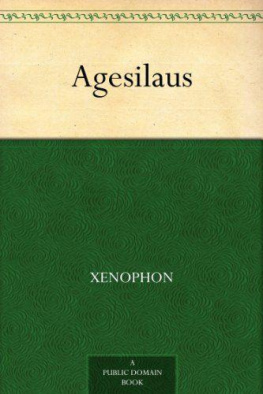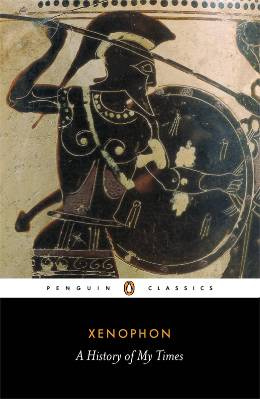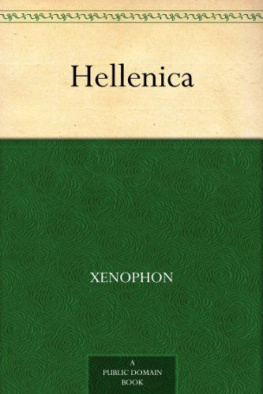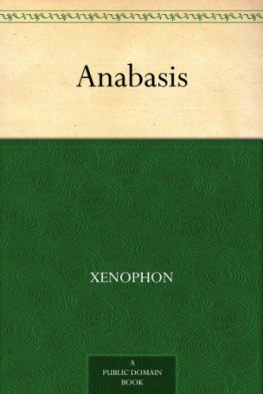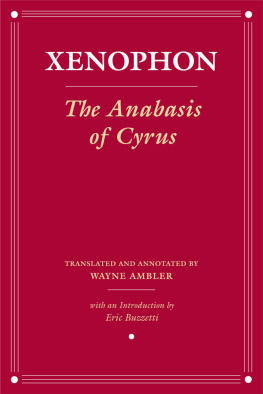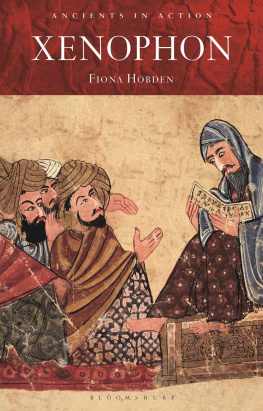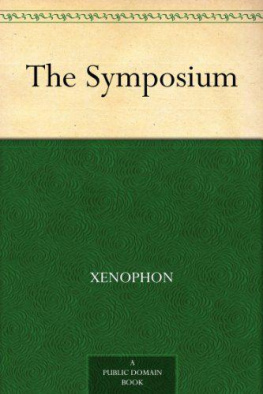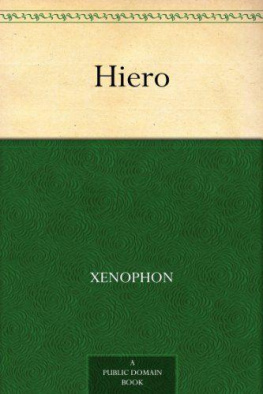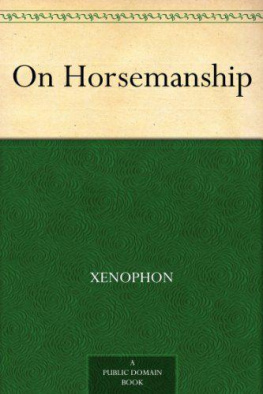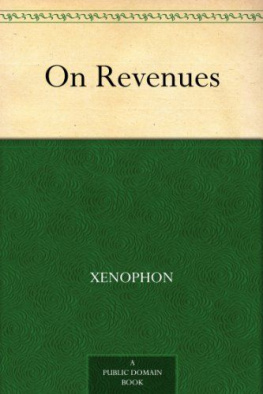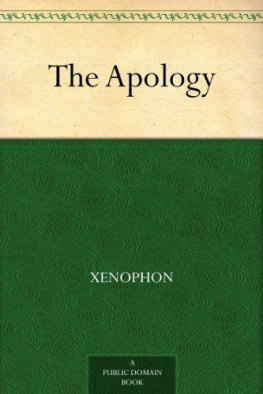Xenophon - Agesilaus
Here you can read online Xenophon - Agesilaus full text of the book (entire story) in english for free. Download pdf and epub, get meaning, cover and reviews about this ebook. year: 2012, genre: History. Description of the work, (preface) as well as reviews are available. Best literature library LitArk.com created for fans of good reading and offers a wide selection of genres:
Romance novel
Science fiction
Adventure
Detective
Science
History
Home and family
Prose
Art
Politics
Computer
Non-fiction
Religion
Business
Children
Humor
Choose a favorite category and find really read worthwhile books. Enjoy immersion in the world of imagination, feel the emotions of the characters or learn something new for yourself, make an fascinating discovery.
Agesilaus: summary, description and annotation
We offer to read an annotation, description, summary or preface (depends on what the author of the book "Agesilaus" wrote himself). If you haven't found the necessary information about the book — write in the comments, we will try to find it.
Agesilaus — read online for free the complete book (whole text) full work
Below is the text of the book, divided by pages. System saving the place of the last page read, allows you to conveniently read the book "Agesilaus" online for free, without having to search again every time where you left off. Put a bookmark, and you can go to the page where you finished reading at any time.
Font size:
Interval:
Bookmark:
Dedicated To
Rev. B. Jowett, M.A.
Master of Balliol College
Regius Professor of Greek in the University of Oxford
Xenophon the Athenian was born 431 B.C. He was a
pupil of Socrates. He marched with the Spartans,
and was exiled from Athens. Sparta gave him land
and property in Scillus, where he lived for many
years before having to move once more, to settle
in Corinth. He died in 354 B.C.
The Agesilaus summarises the life of his Spartan
friend and king, whom he met after the events of
the Anabasis.
This was typed from Dakyns' series, "The Works of Xenophon," a
four-volume set. The complete list of Xenophon's works (though
there is doubt about some of these) is:
Work Number of books
The Anabasis 7
The Hellenica 7
The Cyropaedia 8
The Memorabilia 4
The Symposium 1
The Economist 1
On Horsemanship 1
The Sportsman 1
The Cavalry General 1
The Apology 1
On Revenues 1
The Hiero 1
The Agesilaus 1
The Polity of the Athenians and the Lacedaemonians 2
Text in brackets "{}" is my transliteration of Greek text into
English using an Oxford English Dictionary alphabet table. The
diacritical marks have been lost.
The date of Agesilaus's death is uncertain360 B.C. (Grote,
"H. G." ix. 336); 358 B.C. (Curt. iv. 196, Eng. tr.)
To write the praises of Agesilaus in language equalling his virtue and renown is, I know, no easy task; yet must it be essayed; since it were but an ill requital of pre-eminence, that, on the ground of his perfection, a good man should forfeit the tribute even of imperfect praise.
As touching, therefore, the excellency of his birth, what weightier, what nobler testimony can be adduced than this one fact? To the commemorative list of famous ancestry is added to-day the name (1) Agesilaus as holding this or that numerical descent from Heracles, and these ancestors no private persons, but kings sprung from the loins of kings. Nor is it open to the gainsayer to contend that they were kings indeed but of some chance city. Not so, but even as their family holds highest honour in their fatherland, so too is their city the most glorious in Hellas, whereby they hold, not primacy over the second best, but among leaders they have leadership.
(1) Or, "even to-day, in the proud bead-roll of his ancestry he stands
commemorated, in numerical descent from Heracles."
And herein it is open to us to praise both his fatherland and his family. It is notable that never throughout these ages has Lacedaemon, out of envy of the privilege accorded to her kings, tried to dissolve their rule; nor ever yet throughout these ages have her kings strained after greater powers than those which limited their heritage of kingship from the first. Wherefore, while all other forms of government, democracies and oligarchies, tyrannies and monarchies, alike have failed to maintain their continuity unbroken, here, as the sole exception, endures indissolubly their kingship. (2)
(2) See "Cyrop." I. i. 1.
And next in token of an aptitude for kingship seen in Agesilaus, before even he entered upon office, I note these signs. On the death of Agis, king of Lacedaemon, there were rival claimants to the throne. Leotychides claimed the succession as being the son of Agis, and Agesilaus as the son of Archidamus. But the verdict of Lacedaemon favoured Agesilaus as being in point of family and virtue unimpeachable, (3) and so they set him on the throne. And yet, in this princeliest of cities so to be selected by the noblest citizens as worthy of highest privilege, argues, methinks conclusively, an excellence forerunning exercise of rule. (4)
(3) For this matter see "Hell." III. iii. 1-6; V. iv. 13; Plut.
"Ages." iii. 3 (Cloigh, iv. 3 foll.); Paus. iii. 3.
(4) See Aristides ("Rhet." 776), who quotes the passage for its
measured cadence.
And so I pass on at once to narrate the chief achievements of his reign, since by the light of deeds the character of him who wrought them will, if I mistake not, best shine forth.
Agesilaus was still a youth (5) when he obtained the kingdom, and he was still but a novice in his office when the news came that the king of Persia was collecting a mighty armament by sea and land for the invasion of Hellas. The Lacedaemonians and their allies sat debating these matters, when Agesilaus undertook to cross over into Asia. He only asked for thirty Spartans and two thousand New Citizens, (6) besides a contingent of the allies six thousand strong; with these he would cross over into Asia and endeavour to effect a peace; or, if the barbarian preferred war, he would leave him little leisure to invade Hellas.
(5) B.C. 399; according to Plut. ("Ages." ad fin.) he was forty-three,
and therefore still "not old." See "Hell." III. iv. 1 for the
startling news, B.C. 396.
(6) For the class of Neodamodes, see Arnold's note to Thuc. v. 34
(Jowett, "Thuc." ii. 307); also Thuc. vii. 58; "Hell." I. iii. 15.
The proposal was welcomed with enthusiasm on the part of many. They could not but admire the eagerness of their king to retaliate upon the Persian for his former invasions of Hellas by counter-invasion on his own soil. They liked the preference also which he showed for attacking rather than awaiting his enemy's attack, and his intention to carry on the war at the expense of Persia rather than that of Hellas; but it was the perfection of policy, they felt, so to change the arena of battle, with Asia as the prize of victory instead of Hellas. If we pass on to the moment when he had received his army and set sail, I can conceive no clearer exposition of his generalship than the bare narration of his exploits.
The scene is Asia, and this his first achievement. Tissaphernes had sworn an oath to Agesilaus on this wise: if Agesilaus would grant him an armistice until the return of certain ambassadors whom he would send to the king, he (Tissaphernes) would do his utmost to procure the independence of the Hellenic cities in Asia. And Agesilaus took a counter oath: without fraud or covin to observe the armistice during the three months (7) necessary to that transaction. But the compact was scarcely made when Tissaphernes gave the lie to the solemn undertaking he had sworn to. So far from effecting peace, he begged the King to send him a large armament in addition to that which he already had. As to Agesilaus, though he was well aware of these proceedings, he adhered loyally to the armistice.
(7) See Grote, "H. G." x. 359; "Hell." III. iv. 5.
And for myself, I look upon this as the first glorious achievement of the Spartan. By displaying the perjury of Tissaphernes he robbed him of his credit with all the world; by the exhibition of himself in contrast as a man who ratified his oath and would not gainsay an article of his agreement, he gave all men, Hellenes and barbarians alike, encouragement to make covenant with him to the full extent of his desire.
When Tissaphernes, priding himself on the strength of that army which had come down to aid him, bade Agesilaus to be gone from Asia or to prepare for war, (8) deep was the vexation depicted on the faces of the Lacedaemonians there present and their allies, as they realised that the scanty force of Agesilaus was all too small to cope with the armaments of Persia. But the brow of their general was lit with joy as gaily he bade the ambassadors take back this answer to Tissaphernes: "I hold myself indebted to your master for the perjury whereby he has obtained to himself the hostility of heaven, and made the gods themselves allies of Hellas." And so without further pause he published a general order to his soldiers to pack their baggage and prepare for active service; and to the several cities which lay on the line of march to Caria, the order sped to have their markets in readiness; while to the men of Ionia and the Aeolid and the Hellespont he sent despatches bidding them send their contingents to Ephesus to join in the campaign.
Font size:
Interval:
Bookmark:
Similar books «Agesilaus»
Look at similar books to Agesilaus. We have selected literature similar in name and meaning in the hope of providing readers with more options to find new, interesting, not yet read works.
Discussion, reviews of the book Agesilaus and just readers' own opinions. Leave your comments, write what you think about the work, its meaning or the main characters. Specify what exactly you liked and what you didn't like, and why you think so.

